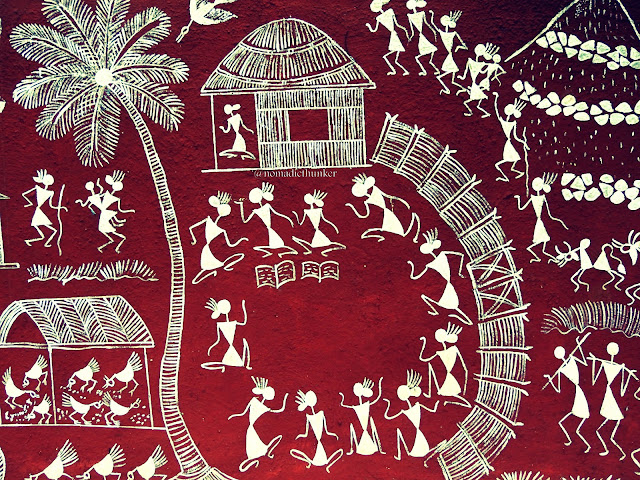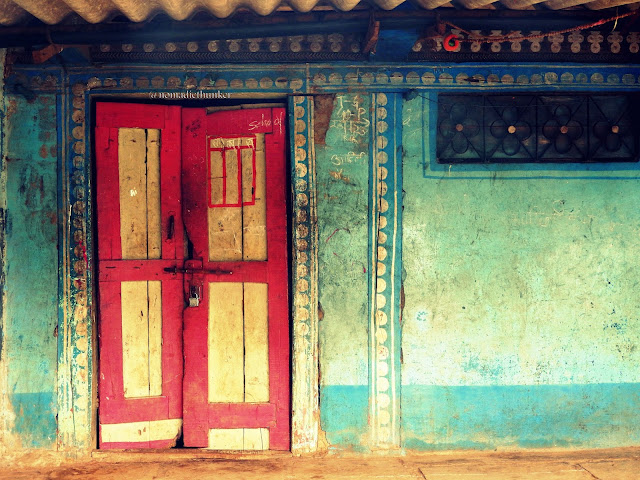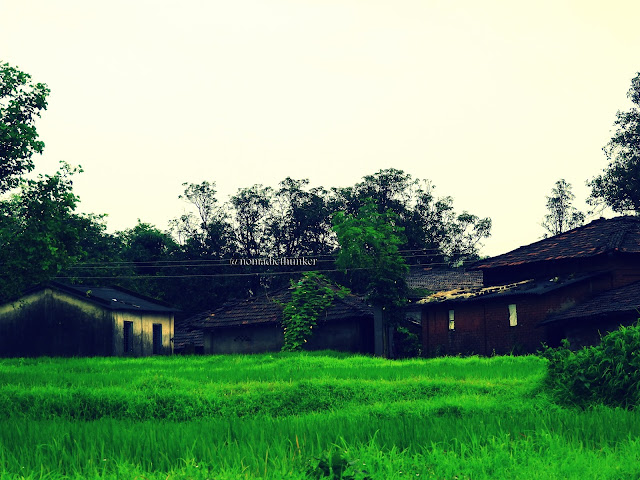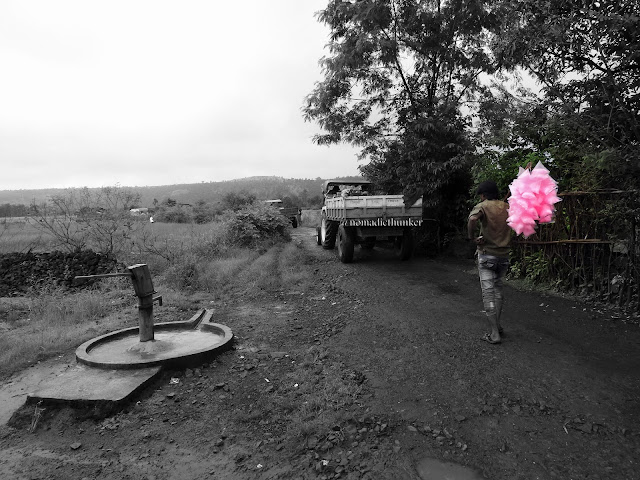“Come home”, she said in Marathi.
I almost turned to look behind if she meant to say that to somebody
else. But there was no ‘somebody else’. It was 3 in the afternoon. My friend
and I, caught unawares by a downpour on our post-lunch walk, were taking
shelter under a flimsy tree while the rains lashed directionless and the whooshing
winds left us drenched and shivering right down to our bones.
She stood there with her umbrella, waiting for our response.
Strangely, I felt compelled to say, “Thank you. But it’s okay. We’re
alright here.”
She refused to comply.
Thankfully.
Soon three heads were jostling for space under the umbrella as we made
our way to her house – which was on the incline adjacent to the road. There
were just two other houses around it.
A tribal village, hers was a house made of karvi sticks slathered with dung and mud. These seemingly deceptive houses withstand
the monsoons minus leakages, offer respite indoors from the incinerating heat
during the summers and make you want to coil up during the winters. Sadly, under
the Indira Awaas Yojana, many of these earth-friendly houses have had to make
way for the not so earth-friendly brick and mortar!
Once indoors, my bones were grateful that my brain hadn’t gotten its
way in declining the offer for shelter and the opportunity to dry off. My good Samaritan offered to make us some tea; which this time I happily accepted.
There was one question I was itching to have answered, so I spat it
out: How did you spot us? She smiled and said, “My sons had left to go out a
while ago and when it started to rain, I stepped out to check if anybody had
seen them. I was speaking to those boys who were on the cycle and that’s when I
saw you’ll under the tree. I didn’t want to leave you’ll there, so I asked you’ll
to come home. I’m sorry but our house is very basic…” Her voiced trailed and I
began to piece together her hesitation because of how little she thought she
had to offer.
Nodding in disagreement I said, “Your gesture to welcome us strangers
into your home and keep us under your roof is more than we could have hoped to
have. If it weren’t for you, we would still be out there cold shivering like a
leaf!”
---
The perks of bagging a gig that involves travel for work is that I
spent a couple of days in September at villages in the outskirts of Mumbai
city. On assignment with Grassroutes – a rural tourism company aimed at egging
city-bred folk like you and me to explore and experience the village life in exchange
of providing our rural counterparts with an alternative livelihood – it wasn’t
a first in these villages for me. But that’s the thing with travel; the places
can be the same, the people can also be the same and yet, it’s your experiences
that tell every visit apart!
 |
| Warli paintings on display at Valwanda. This depiction of adult education in the community is reflective of bygone times. |
 |
| Learning the art of stillness in Dehena |
 |
| Locked doors - raising curiosity and fuelling creativity since forever. As seen at Purushwadi |
And as much as there exists the temptation to (over)romanticise the
countryside, it helps to have a balanced viewpoint and acknowledge the
challenges it entails for those who have been living through it!
For instance,
public transport is not as coordinated as we are used to having it in the urban
areas. This means that to traverse distances, people hop into
shared-taxis/jeeps where 15 people are force-fit in one vehicle (excluding the
driver).
Or how electricity supply can be intermittent and therefore
disorienting to one’s daily schedule.
Or how procuring household supplies is
not as simple as taking a walk to the nearby supermarket – because no such
thing exists and therefore, purchases require a certain kind of foresight as local markets are a weekly phenomenon!
And in spite of it all, it is the hospitality, the warmth and most
importantly the patience I’ve witnessed in these rural folk that teaches me a
thing or two about my own illusions of control. It is that reverence for nature
that teaches me about interconnectedness and the true spirit of sustainability.
 |
| Cattle shed made from karvi sticks at Dehena |
 |
| All things verdant in Valwanda while invoking the romanticization of the countryside |
 |
| As rustic as it gets in Purushwadi |
I learnt one more thing – albeit the hard way. No amount of swatting
mosquitoes can help reduce your chances of contracting dengue! I have since
then thankfully been cured and have recovered most of my stamina minus the need
for any hospitalisation.
Do instances like these make me want to be selective about the places
I travel to? No way. But they certainly remind me that taking precautions
cannot be overstated - no matter how seasoned a traveller I consider myself.
 |
| A rudimentary but brilliant set-up at Valwanda to catch fish from the river |
 |
| When urbanization casts a shadow on your childhood memories and you squeal with delight on sighting it decades later in Dehena |
 |
| When you see in Dehena what Wordsworth and Blake and Frost were talking about |
 |
| Because how often do you stand atop a dam? Unless, of course, you are at Purushwadi |
P.S.: I know you don't like annoying pop-ups. So if you like the posts you see on my blog, you could also Subscribe to HaveFeetWillTravel by Email and receive newer ones directly to your inbox!